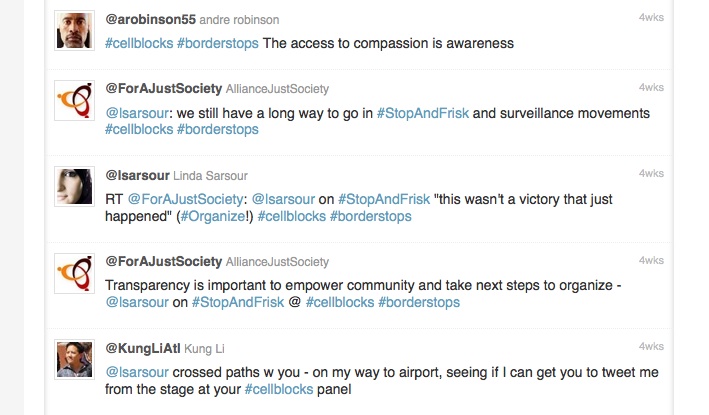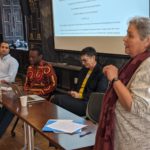Re-Posted from the Institute for Pragmatic Practice (www.pragmaticpractice.org)
In the last four decades, mass incarceration and immigration control in the United States has skyrocketed. Our nation has become an engine that pulls people from their communities, removing them from the very fabric that gives them their humanity. Over-policing of everyday lives has made the simple act of walking down one’s street a criminal act. The criminalization of communities is evermore presenting itself as a system of violence against them.
pulls people from their communities, removing them from the very fabric that gives them their humanity. Over-policing of everyday lives has made the simple act of walking down one’s street a criminal act. The criminalization of communities is evermore presenting itself as a system of violence against them.
The Institute for Pragmatic Practice held an incredible symposium October 17-18, that brought voice to those affected by incarceration. Cell Blocks and Border Stops: Transformation in the age of dehumanization brought faces to those who have been invisible behind walls and in communities that are left behind.
While these manifestations of state violence may have different expressions, the underlying issues are similar across communities and experiences.
Criminalization of black and brown people, of immigrants, of those who challenge sexual and gender norms, and of dissidents, is a critical aspect of legitimizing the apparatus of state violence.
 Attendees and organizers left with a better understanding of how deep the problem runs in our country; but rose with a resolve to battle against the oppression and find solutions to rise above it.
Attendees and organizers left with a better understanding of how deep the problem runs in our country; but rose with a resolve to battle against the oppression and find solutions to rise above it.
The first plenary day began beneath the vibrant sun piercing through colorful steal glass windows as over one hundred and fifty people filled the sanctuary of the small, historic James Chapel at Union Theological Seminary in New York City. “Marketing terror and trauma is profitable in this democracy.”
Professor Joy James of Williams college silenced the crowd. The profitability of incarceration and the build up of a policing system was further explored by panelists Abraham Paulos (Families for Freedom); Jessica Black (Council of Athabascan Tribal Governments), and Monami Maulik (DRUM). The panel discussed the concept of criminalization as being a tool of state violence — and corporate enrichment — used to marginalize and punish racial “outsiders” in the name of protecting society from supposed predators, and explored different aspects of carceral control and militarization of policing and immigration, highlighting the ways in which criminalization affects different communities.
These crises overlap in ways that devalue and dehumanize ever-expanding circles of people. However, within our various ethical and spiritual traditions there are seeds of resistance to expanding incarceration, and alternative understandings of how we can support thriving, flourishing humanity. Simply put, the beds that are emptied in traditional prisons because of systematic challenges to unfair and unjust punishment, are filled with immigrant detainees.
While presenters made clear that there is no one-to-one ratio that can be found, following the investments, following the profit trail is a direct equation between incarceration of people of color (read citizens or documented immigrants) and undocumented detainees.
“The panelists were chosen so well, they hit everything I experienced in prison. They don’t leave it at talk.” said one participant. He himself is a former prisoner released only weeks before the symposium. He now meets with his parole officer, and dances in a Modern Dance troupe Figures in Flight Five. The troupe comprised of all former inmates, performed on Friday evening to standing ovations.
Think and do. The symposium held true to the simple foundation of the Institute—to understand the complexity of an issue, and to identify clear organizing objectives to affect change. To take action.
Breakout sessions took participants through the details of messaging and framework. Makani Themba, Executive Director of the Praxis Project, made it clear with one phrase. To understand the difference between the system we have and the systems we want, we have to identify the core of what drives us: All human beings count. In its simplicity came thorough conversation on how to and why we discuss systemic problems alongside tangible objectives.
Other breakouts included (1) The Criminal Justice and Immigration System’s Systemic Alienation—moderated by Fernando Meija with panelists Daniel Coates (Make the Road New York); Opal Tometi (Black Alliance for Immigrant Justice); Tongo Eisen-Martin, and Akilah Kinnison; (2) Copwatch Training presented by Djibril Toure; or (3) Follow the Money: Criminalization, Finance, and Profits—moderated by Gary Delgado with panelist Bob Llibel (Grassroots Leadership), Jusy Green (Justice Strategy) and Jamie Trinkle (Enlace).
The Alliance for a Just Society opened up the days’ discussions on social media. Reaching a universe of people just over 100,000 people involved in efforts to change the criminal justice system, involved in the fight for immigrant rights and citizenship. When millions of people have become casualties our neoliberal system so rooted in racism, it will take growing connections between the thinkers and the doers to end systems that deem our communities as “throw-away” or “cast-aways.”
While the system in place today is driven by fear: The solution will take “hope” and “courage”.
As LeeAnn Hall, Alliance Executive Director, toured the room in the final session she asked participants for one word to describe how they felt; what their individual takeaway was after such an intense and powerful three days. These were the two words repeated as she moved the microphone across the crowd.
Organizing against unjust incarceration, over-policing and the systemic machine that targets undocumented immigrants will take the efforts of every person in that room.
Related articles
- Holder proposes changes in criminal justice system (bigstory.ap.org)
